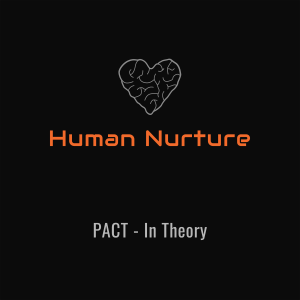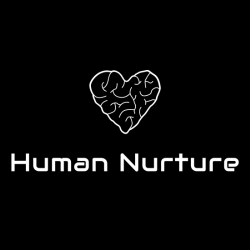Episodes

Tuesday Mar 24, 2020
Human Nurture - Bonus Ep - PACT in Theory - Jeff Pincus on PACT Video Sessions
Tuesday Mar 24, 2020
Tuesday Mar 24, 2020
Over the past couple of weeks, we have all been living through a huge shift in our lives due to the outbreak of the Covid-19 virus. For PACT therapists, this has meant moving our work as couples therapists from our offices to online.
For many of us, myself included, this has come with quite a bit of worry about the effectiveness of working online, about not being able to properly intervene when couples become dis-regulated and tracking my own self-regulation.
It was heartening to know that I wasn't alone with these worries when similar concerns were expressed on the PACT list serve by other PACT therapists. A thoughtful and reassuring response was written by long time PACT therapist, Jeff Pincus (see below) about how he approaches online sessions.
This bonus episode features Jeff and I discussing the shift to working online with our couples. After the interview, I felt more grounded in my work, used many of the intervention strategies discussed and found myself having an easier time in my online sessions.
This all feels like a day-to-day operation at this point and things seem to go best with a combination of creating structure and taking deep breaths. It certainly is an extraordinary and scary time and I hope you all are doing okay.
Jeff's website: https://couplestherapyboulder.com/wp/
Here is the original piece that Jeff wrote to the PACT community on the list serve.
Hi Everyone,
I thought that I would share my thoughts and experience on this topic. I am only addressing my clinical observations and thoughts, not any legal or technological issues associated with video sessions, and I will let others address those questions and concerns.
For many years, I avoided doing couples sessions over video as I felt that the medium handicapped me from doing my best work. Video just felt too flat and less dimensional, which of course it is. My experience was that there were fewer data streams available for me to formulate the most effective assessments and interventions, and that my own somato-affective experience was a bit blunted. Over the years, I’ve found myself relying more and more on my counter-transference to formulate hypotheses, craft experiments, and initiate interventions; in a sense, using my whole body to my job.
Another limitation I found was that my ability to regulate partners when appropriate was more challenging. I would have to break my visual data stream of looking at the screen and observing what was going on in the client/couple, and intentionally look at the camera so that the partner experiences me as looking directly in their eyes. In that moment, I’m blind to what is actually happening, and the impact of my intervention. This technology problem is likely to be fixed someday soon, I hear.
I have had a few couples who maintained our working relationship over video more recently, and my observations after many sessions have been positive. I’ve noticed that the limited data streams have amplified my focus on the available streams in a manner that I wouldn’t do with couples in my office. I can stare closely at their faces and body movements in a manner that would be downright creepy in my office, so I’m able to pick up more information.
I’ve also noticed that when the lighting was poor for a moment due to changes in sunlight or the couples’ movement in relation to their lighting source, I would focus strongly on prosody alone, and hear more nuance because it was my only source of information. My thinking is that these data streams (signals) get amplified when there are fewer other streams of information (noise) coming into my processing system (mind/brain). This has to do with focusing on one thing instead of several things.
The other benefit that I saw is that I had to get even craftier in directing interactive regulation since I was out of the scene, and more distanced from the couple in every way. Often, I have them look at each other (as I do in my office) but I’m even more of a narrator and director as I’m a disembodied voice. This has benefits as it’s even more about THEM and less about me. My presence is further diminished and their presence is amplified with each other which can be very beneficial if you know how to direct them.
My final thought has to do with memory. So much of PACT and good experiential psychodynamic therapy and trauma therapy has to do with the re-consolidation of memory. As clinicians, we’re most effective at fostering trait change when we intervene in the problematic states that cause pain, limitation or dysfunction. Our goal is to create a new (state-specific) memory so that our client has the experience of another way, a better move, a more loving response, etc., when they find themselves in the same situation OUTSIDE the office. Working via video allows for place-specific memory. Ideally, the couple is in their home, which is usually the environment where they get in to trouble. Now, not only are we going to work with the problematic state, but we are doing it in the environment that can cue them (via memory and association) to try the new, better, more mature move.
I’m sure you’ve all had clients say how well they do in your office, yet it’s been hard to do it at home. Well, now we are making a virtual house call, and I believe that it will be easier to “do it at home” because they’re practicing at home. Environmental cues are powerful triggers for right brain, subcortical processes. Place does affect state.
Personally, I am switching to video sessions for the time being. I believe that social distancing is the most responsible thing that I can do to help flatten the curve of lethality for COVID-19, which is especially important for the most vulnerable members of our society and us all.
I hope this was helpful.
I wish you all safety and good health!
Jeff


No comments yet. Be the first to say something!